Best OSCP Certification Training In India | OSCP PEN-200 Course
June 14, 2022 2024-10-03 12:24Best OSCP Certification Training In India | OSCP PEN-200 Course

OSCP Certification Training in India | OSCP Pen 200
Bestseller
3571 Student Reviews
- Course Duration : 120 Hours
- Language : Hindi | English
- Course Delivery : Online | offline
Book a Trial Demo Class
Training Available 24*7 Call at 9513805401
What will you learn in OSCP Certification Training in India?
With the help of a primetime course content powered by Offensive Security – the high-profile giant in cyber security and penetration testing, Craw Security is offering genuine OSCP Certification Training in India through the most elite training personnel of information security.
Moreover, the authentic VAPT, commonly referred to as the Pentesting Course of OSCP Certification in India, is delivered through a verified curriculum nicely scrutinized and recognized by Offensive Security, New York, USA. Hence, don’t wait and enroll now in the upcoming batches of this crucial OSCP Certification in India.
There is a high-end major industrially renowned Penetration Testing with Kali Linux (PWK/PEN-200) course that has been enhanced with the submission of 5 latest retired OSCP exam machines to PWK labs. These specialized five machines portray a complete OSCP exam room! This particular self-paced online ethical hacking course prefaces a series of pentesting tools and techniques with a long-lasting, practical experience.
This PEN-200 and the OSCP Certification Training prepare individuals with numerous skills to become successful penetration testers in the market. The genuinely successful students who complete this course and pass the exam will earn the credential of Offensive Security Certified Professional (OSCP) Certification.
Craw Security's High End Learning Labs






OSCP PEN-200 Course Content
For Linux Machines:
| Module | Description |
|---|---|
| Module 01: Penetration Testing: What You Should Know |
|
| Module 02: Getting Comfortable with Kali Linux |
|
| Module 03: Command Line Fun |
|
| Module 04: Practical Tools |
|
| Module 05: Bash Scripting |
|
| Module 06: Passive Information Gathering |
|
| Module 07: Active Information Gathering |
|
| Module 08: Vulnerability Scanning |
|
| Module 09: Web Application Attacks |
|
| Module 10: Client-Side Attacks |
|
| Module 11: Locating Public Exploits |
|
| Module 12: Fixing Exploits |
|
| Module 13: File Transfers |
|
| Module 14: Antivirus Evasion |
|
| Module 15: Privilege Escalation |
|
| Module 16: Password Attacks |
|
| Module 17: Port Redirection and Tunneling |
|
| Module 18: The Metasploit Framework |
|
For Windows Machines:
| Module | Description |
|---|---|
| Module 01: Penetration Testing: What You Should Know |
|
| Module 02: Command Line Fun |
|
| Module 03: Practical Tools |
|
| Module 04: Passive Information Gathering |
|
| Module 05: Active Information Gathering |
|
| Module 06: Vulnerability Scanning |
|
| Module 07: Web Application Attacks |
|
| Module 08: Client-Side Attacks |
|
| Module 09: Locating Public Exploits |
|
| Module 10: Fixing Exploits |
|
| Module 11: File Transfers |
|
| Module 12: Antivirus Evasion |
|
| Module 13: Privilege Escalation |
|
| Module 14: Password Attacks |
|
| Module 15: Port Redirection and Tunneling |
|
| Module 16: Active Directory Attacks |
|
| Module 17: The Metasploit Framework |
|
| Module 18: PowerShell Empire |
|
| Module 19: Assembling the Pieces: Penetration Test Breakdown |
|
| Module 20: Trying Harder: The Labs |
|
OSCP Our Course Advisor
Best OSCP Training in India
OSCP PEN-200 Training Course Highlights
- Access to the latest retired OSCP exam machines - new!
- Learn the "Try Harder" method and mindset
- Earn the industry-leading OSCP certification
- Introduction to the latest hacking tools and techniques
- Training from the experts behind Kali Linux
Choose Your Preferred Learning Mode

Classroom Training
We offer customized VILT (Virtual Instructor-Led Training) sessions at your convenient hours to provide effortless training.

Online Training Class
One can also opt for the prerecorded video sessions available at any point of time from any particular location.

Corporate Training
Hire a preferred trainer at your work premises at your chosen time slots and train your employees with full efficiency.
Craw Security's Students Awarded
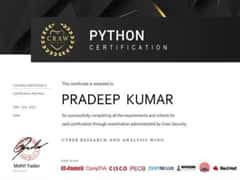
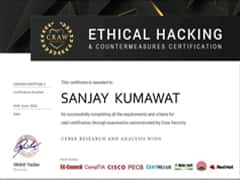
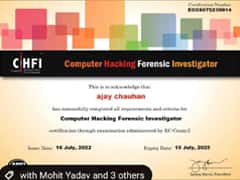
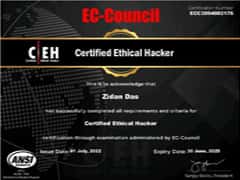
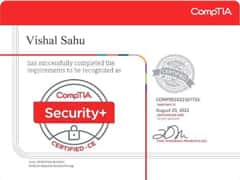
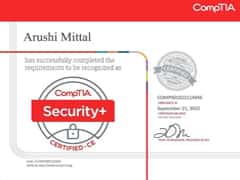
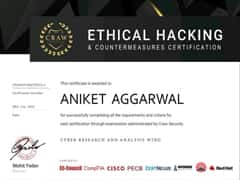
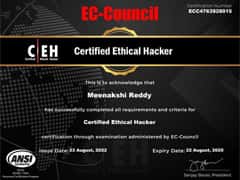
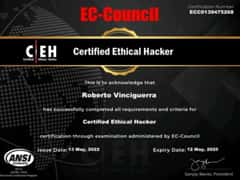

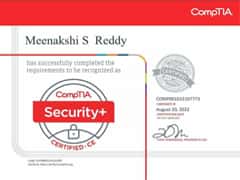
Who should do OSCP Certification Training?
● Infosec working experts thinking of a changeover into penetration testing.
● Pentesters watching an industry-leading certification for career growth.
● Security professionals.
● Network administrators.
● Other technology professionals.
OSCP Certification Training Prerequisites
All students are required to have the following:
● Solid understanding of TCP/IP networking
● Reasonable Windows and Linux administration experience
● Familiarity with basic Bash and/or Python scripting
Related Cyber Security Course
What People Are Saying About Craw Security
Google Review (3,656) ★★★★★







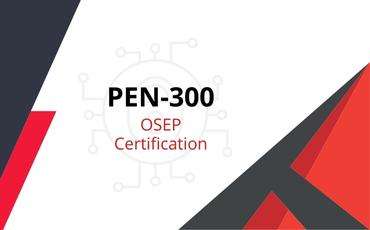






Comments are closed.